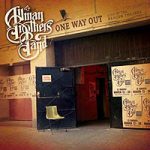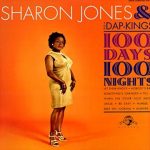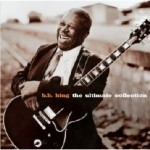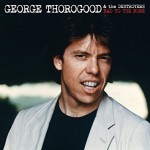Derek Trucks is recognized as one of the all-time great slide guitarists, and after a long tenure in the Allman Brothers Band is now co-leader of the Tedeschi Trucks Band along with his singer/guitarist wife Susan Tedeschi.
One might say that music is in Trucks’ blood: his uncle, the late drummer Butch Trucks, was a founding member of the Allman Brothers Band, and the name “Derek” came from “Layla” band Derek and the Dominoes, which featured Eric Clapton and original Allman Brothers’ guitarist Duane Allman. For the curious, in Dominoes-speak, Derek = Duane + Eric. Fittingly, the young Derek Trucks shared the stage with Eric Clapton, plus many, many others.
The Tedeschi Trucks Band released their third studio album Let Me Get By in 2016, and their second live album Live from the Fox Oakland in 2017.
This interview was for the 11/7/17 Tedeschi Trucks Band concert at the Arlington Theatre in Santa Barbara, California. It was done by phone on 10/24/17. (Stuart Levine photo)
Jeff Moehlis: A lot of people – and maybe you agree – think that Tedeschi Trucks is best experienced live, but I’ve been listening to your latest studio album Let Me Get By which is really great. How did that album come together?

Derek Trucks: That was the first record we had done being off a major label, and just kind of doing it all on our own. I think we just relaxed into it a little bit, and we did everything in house. All the tunes were written at home in the studio with the band, and we recorded it all there and mixed it all there. It was just one of those records that come together pretty organically. You know, there’s something to that.
I think going forward that’s certainly the MO. I mean, with a band this big you have to think a year out, you have to schedule things. But with this one, we really kind of let it happen as it happened, as people were feeling creative, and as tunes were coming we just would set up and record. There was something nice about the tunes being written with the band members, instead of just teaming up with a few people here and there. There was a lot of group improvisation that turned into tunes, and things like that. I think this one, more than any other studio record we’ve done, really represents the personality of the band, and I think it’s important to capture that as much as you can.
JM: I understand that you were the producer of the album. What are you like as a producer?
DT: More than anything, you’re just the one with your head in the game until it’s done [laughs]. You really never stop thinking about it. And knowing everybody in the band, and having played with everybody long enough, you get a sense of what people are capable of, and what the best is that you can get out of people. So I think it’s really knowing when to push, knowing when to pull back, kind of hearing around the corner a little bit. It’s kind of what you do as a bandleader in general, but when you move into the studio it’s just a little different part of that muscle, I guess.
JM: How does your approach to the Tedeschi Trucks Band differ from the previous bands you were a part of, the Derek Trucks Band and the Allman Brothers Band?
DT: You know, in some sense you approach all of it the same way. You put whatever energy and inspiration you have into it, and you try to make it go [laughs]. But your role changes a little bit.

Obviously in the Allman Brothers when I joined I was 19 or 20 years old, and the band was 30 years old at that time. You’re coming in as the kid, and you have to navigate what that entails. So there’s certain things you hear that maybe you would tweak if it was your own thing, that you’re just going to kind of be along for the ride [laughs]. The longer you’re there, the more you voice your opinion, and the more you start steering the ship a little bit. Because that band was very open. There was no full-on leader, I think really since Duane passed. Dickey [Betts] took over for a while, but once he was gone it was kind of by committee. So the longer I was there, the more comfortable you feel chiming in and steering it in different directions.
With my solo band, obviously you’re in more of a leadership role. I started that band at 14, 15, so some of that you’re growing into as well. I think with the Tedeschi-Trucks Band, by the time we put this together I felt much more comfortable in that role. But you’re co-leaders with your wife, so it takes a little while to figure out that dynamic, too. But I think at this point everybody’s roles are really comfortable and defined. It changes from song to song and from record to record, but I think we have a good feel for the way things go best.

JM: I saw you in Santa Barbara two years ago at the Santa Barbara Bowl, and the opener for that show was Sharon Jones. What was it like to tour with her?
DT: She was just a ball of energy [laughs], just an amazing person. She was obviously dealing with some serious health things while she was out on tour with us. I mean, it’s an inspiration to see somebody facing what she was facing, and then get on stage every night and just wear it out [laughs]. It’s humbling to see somebody do that. Like it said, it’s inspiring for everyone around it.
There was one night at Red Rocks where we played, where it just started pouring rain during her set. There was this puddle probably two inches deep in the middle of the stage, and she was out there with a live microphone just dancing in it barefoot [laughs]. She was facing what she had coming. Everyone in the crowd and everyone on the stage got this sense that if she goes now, she is fully content. It was a powerful moment. You could just feel it. But it was also kind of terrifying [laughs]. That was kind of her in a nutshell to me. She knew what she was facing down, and she just aired it out all the way to the end. She was strong.
JM: Unfortunately she passed away – it’s sad how many artists have passed away recently, including some that you were particularly close to. To help celebrate their lives, are you willing to share a memory that you have from your time with Butch [Trucks] and Gregg [Allman] and the rest of the Allman Brothers Band?
DT: You know, I loosely grew up around them, and was close and around them from the time I was probably 9 or 10 years old. It’s such a big part of your life – it’s kind of hard to focus in on any one story.
Just recently we were playing the Beacon Theater with this group, the first time since Butch and Gregg passed. The first show you’re kind of running on adrenaline, and just trying to make it go. By the second night you kind of relax a little bit. I don’t even remember what tune it was, but we got into that place, where you get into that flow state a little bit. All of a sudden, it just kind of hit me.
![]()
I remembered that I’d been on that stage probably 180 shows with Butch and Gregg, and to my back left I kind of felt Butch there, just kind of imagined him there, and the same with Gregg to my right. You know, when you’re playing music you get visited [laughs]. Sometimes I feel that whatever bullshit comes and goes over the years, when you’re really playing and you’re really locked in, I feel like all that stuff falls away and you kind of remember those moments where you really connected. Because there was some magic made on that stage with those guys. I felt like that, in some ways, was kind of a release. And that was just a few weeks ago when we were at the Beacon. Those are the times where you really get to make peace with it, and you remember those guys in a real way.
I mean, we knew them as people, but we spent more time making music together – just hundreds and hundreds and hundreds of shows [laughs], where you’re digging in and going to that place… I mean, when you’re improvising and you’re really getting into it with people, I feel like there’s a level of trust and connection that you don’t really get in many other aspects of your life. I feel like that’s kind of where you go when you need to connect with those guys [laughs].
Same with Col. Bruce Hampton. We were just on the Fox Theater stage in Atlanta where he passed away. We came back and played a show there, and that was a tough one to get through. It’s been quite a year. Just today we learned about Chuck Blackwell, who was the drummer in the Mad Dogs & Englishmen show that we did with Leon [Russell]. Chuck was a total badass. He played on all those Freddie King records, and just tons and tons of great stuff. He was really close with our drummers – they made a great connection when we did those shows together.
The old guard is leaving us, that’s for sure.
JM: But it’s great that people like you are keeping the spirit alive.
DT: You try, man, you try. You know, when you get to meet people like that and really connect with them, you feel indebted to them. But it definitely steels you to want keep doing it, to keep bringing that stuff to people. I mean, they were innovators, but they were also carrying on a tradition. Those guys saw James Brown and those bands, and they saw these great drummers and it made them want to carry that on in their own way.
I think in some ways in a band like this you become a link in that chain. You keep doing it long enough, and if you do it well enough, hopefully you’ll start inspiring a different generation. And you definitely start noticing when you look around that there’s not a lot of people doing it, so it makes it… I don’t want to say that it makes it feel more important, but it makes you feel like you really have to up the bar and keep it there, just to make sure it doesn’t go anywhere.
JM: In addition to your bandmates over the years, you’ve recorded and performed with an amazing list of people. Are there any that really stick out to you?

DT: Like you said, we’ve been incredibly fortunate. I mean, B.B. King sticks out because he was such a seminal figure, and he was such a gentlemen and just a hero. We had a few moments – me and Susan – onstage with B.B. and it was just magic, where you’re really connected and you can tell what you’re playing is moving to him, and obviously what he’s doing is hitting the spot [laughs] for us. Those were great moments. He was always super sweet to Susan and me and the band. I mean, he’s one that you feel lucky you got to be around him. He made a lot of people feel that way, which is kind of testament to his spirit.
I remember meeting him when I was a kid, probably 10, 15 years before I ever got onstage with him, and he just made you feel like you were long-lost cousins or something [laughs]. He just had that spirit. But when we were on tour with him, I felt like we really got to connect with him a bit. You know, he was getting towards the end of his life, and he was in a very reflective mood at times. It was great when he would just start unwinding stories and give you a glimpse into who he was.
JM: I have a guitar question for you – what’s the secret to playing slide guitar?
DT: Some of it I think is just innate, but it’s all intonation. I think with slide, it’s more your ear than repetition and practice. I think you really have to hear it, you know, when a note’s in tune your instinct kind of puts it there. You just have to listen a little differently. You can’t think patterns or shapes – you really have to think melody and intonation. I think that’s probably it.
I think you really should be thinking like a singer when you’re playing slide. Who knows how far it goes back, but when you hear the early Delta guys, they would substitute the slide for a vocal line at times. They’d sing a line, play it back. It was almost call and response with yourself. So it’s always been very vocal. I think it helps when you think of it from that perspective. That kind of unlocked the whole thing for me, when I started thinking more as a singer, even a Gospel singer. I think it freed a lot of things up.

JM: I asked that same question to George Thorogood when I interviewed him earlier this year, and he basically just laughed and said “Either you can do it or you can’t. There’s no secret.” So you gave a much better answer [both laugh].
One question I always like to ask is the following. What advice would you give to an aspiring musician?
DT: [laughs] Not to mimic his answer, but I always feel like if you’re going to do it, you’re going to do it. If you get the bug, nothing’s going to stop you from doing it. I think if the reason you’re in it is musical, and there’s something there that you just have to keep clawing at [laughs], keep working at, I don’t think you’re going to stop. If you’re career-minded with it, there’s a lot of other things you can do [laughs]. But if it’s musical, and it’s this gnawing thing that you need that sound, or you need to be after a sound, I don’t know if there’s anything that can really stop you.
For me, when I started at a young age, things happened quickly, and then they kind of flattened out for a decade, and you’re playing the same clubs over and over again. If you’re not thinking the long haul it’s easy to get discouraged. But if your mission is musical, and you know that every night’s a chance to get better or stumble across new things, then you’re probably in a good place.
I think all the advice I got when I was young was if you’re willing to play bars for the rest of your life and travel in a van, then you’re doing the right thing [laughs]. You kind of have to be willing to grind it out. And it’s a different day. I try to put myself in the shoes of somebody starting now, and try to imagine if it would happen the same way. Obviously it wouldn’t happen the same way. But there’s not as many live music venues, and there’s not quite as much out there, so I think in some ways it’s a little more difficult. I know you can put your shit up on YouTube now. It’s easier to connect with people broadly if you have something that really connects. But in some ways I think that’s kind of detrimental. You don’t have time to quietly hone your craft – by quietly I mean playing 200 clubs in different cities throughout the year without word really spreading. I think that’s essential in a lot of ways to get to where you want to go. When things happen too quickly, a lot of times it’s not going to last as long, if the gains are too quick.
JM: What’s in the works? I know you have a new live album out, and you’re touring all the time. Are you thinking about another studio album perhaps?
DT: Yeah, I think we’re pretty close to heading back in and recording. We had a health scare with Kofi [Burbridge], our keyboard player, so we’ve been waiting on him to heal up before we get back in the studio. But I think we’re about there on songs.
We actually have a good friend of ours, Oliver Wood from the Wood Brothers, who’s flying in tomorrow. We have a few song ideas that we’re going to work on with him. We’re kind of in that stage of just writing and stacking up ideas. I think within the next few months, on any of the breaks we’re going to be in the studio starting a record. Everybody’s in that mindset.
JM: Are your kids following in your and Susan’s musical footsteps?
DT: Not so much. I mean, they have good taste in music – my son probably more than my daughter at this point [laughs]. Everyone goes through phases. But they’re interested in their own things. My son pitches on his high school baseball team. They’re into their things. But neither one has fully gone down the musical rabbit hole like we have. I still feel like there’s time for that.
JM: It sounds like you’re not pushing them, which probably is the right thing.
DT: Yeah, we figure especially in this day and age there’s a lot of ways you can try to make the world a better place [laughs], so if they have something they’re into, then that’s what we want them to do. We need good people out there, whether it’s music or whatever. So we try to let them find their spot.


Discussion
No comments for “Interview: Derek Trucks”